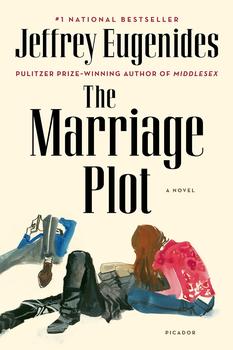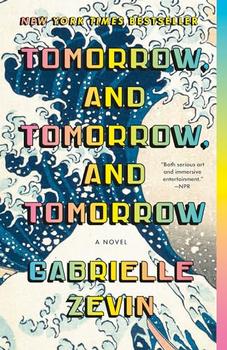Summary | Excerpt | Reading Guide | Reviews | Beyond the book | Read-Alikes | Genres & Themes | Author Bio

A Novel
by Jeffrey EugenidesI knew I would fall in love with The Marriage Plot upon reading the first few lines that portray Madeleine Hanna's tidy bookshelves, which feature Henry James, George Eliot, and Elizabeth Gaskell. Thoughts of immediately penning a six-word review ran through my mind: "Love it, love it, love it." Madeleine, with her thick novels and romantic tendencies, felt like a recreation of me in college, and as I continued to read, I realized that, not only has Jeffrey Eugenides built a world that is personal and collegiate, he has also created a bibliophile's dream. I will shelve it next to familial American narratives like Jonathan Franzen's Freedom and varsity tales like Tom Wolfe's I Am Charlotte Simmons.
The novel is both about an English major and written for English majors. So much so that readers without at least a little sense of Victorian authors and literary theory are likely to be overwhelmed by incessant references and name-dropping. Though the story establishes itself from the beginning as literature about literature, by midpoint it spirals away from this theme and becomes engaged in showing more personal concerns than nineteenth century plot structures and Jacques Derrida's theories. At this turning point, Madeleine's narrative shows how modern love stories have changed since the nineteenth century, but it also illustrates the ways in which romantic stories have remained the same. The novel works hard to link scholarship and everyday life; it explains that there are few homes for Continental philosophers and religious scholars outside of a university, but that these individuals' philosophies are nevertheless pertinent to the activities we tend to think of as banal - such as finding apartments or riding in taxis - or the clichés of backpacking through Europe, going to boozy parties, and falling in love.
Readers who open The Marriage Plot with the expectation of finding the lush language of Eugenides's The Virgin Suicides or the ornate plotting of Middlesex may be disappointed. The story is simple, even a bit old-fashioned, reminiscent of the nineteenth-century character-driven novels that Madeleine studies. Rather than toying with unusual narrators as he does in his previous novels, Eugenides plays with time, building a story that flip-flops between three main narrators, repeating scenes and doubling back on itself to revisit moments through separate eyes. What protects scenes from redundancy are the intense, youthful desires of each speaker and their longings to understand literature, science, religion, and each other.
The Marriage Plot has few stylistic fingerprints; if anything, it shows that Eugenides evades definition. There are tiny plot references to his previous works - a character of Greek descent, a childhood that was spent in Detroit - but the writer's voice bears very little resemblance to that of his other books.
Perhaps it is my affinity for English majors, or perhaps it was Eugenides's embrace of realism and a character-driven plot, but the pages of this novel flew by, despite the book's respectable heft. It is neither a breezy, beachy romance novel nor an intricate, challenging tome, but is balanced squarely between those two poles. Producing a work that is equal parts pleasure and intellectual debate, as the author has done, is as difficult as it is admirable. Eugenides is one of the few literary novelists with a large following and a great amount of popularity among American readers, and The Marriage Plot serves as another example of why his work is so enjoyable.
Additional Info
Listen to (and read excerpts from) the in-depth interview with Jeffrey Eugenides in which he talks about The Marriage Plot with NPR's Terry Gross.
![]() This review was originally published in The BookBrowse Review in October 2011, and has been updated for the
September 2012 edition.
Click here to go to this issue.
This review was originally published in The BookBrowse Review in October 2011, and has been updated for the
September 2012 edition.
Click here to go to this issue.

If you liked The Marriage Plot, try these:

by Sally Rooney
Published 2024
An exquisitely moving story about grief, love, and family―but especially love―from the global phenomenon Sally Rooney.

Tomorrow, and Tomorrow, and Tomorrow
by Gabrielle Zevin
Published 2024
In this exhilarating novel by the best-selling author of The Storied Life of A. J. Fikry two friends - often in love, but never lovers - come together as creative partners in the world of video game design, where success brings them fame, joy, tragedy, duplicity, and, ultimately, a kind of immortality.
Your guide toexceptional books
BookBrowse seeks out and recommends the best in contemporary fiction and nonfiction—books that not only engage and entertain but also deepen our understanding of ourselves and the world around us.